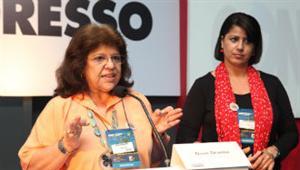Publicado em 30 de maio de 2012 por Cleide Sales
Over 50% of the workforce in the country is female
Created the "Mão na Massa - Mulheres na Construção Civil” (Getting Hands Dirty: Women in Civil Construction) project in 2007. Read More

Over 50% of the workforce in the country is female. Based on this data Deise Gravina conceived and created the "Mão na Massa - Mulheres na Construção Civil” (Getting Hands Dirty: Women in Civil Construction) project in 2007. Seeing the growth in the number of women in the sector of heavy and civil construction, she conducted a survey of low-income women living in Rio de Janeiro’s ‘Morro do Jacarezinho’ community, and found that over 70% of women accepted to train for and work in the construction sector. With this theme, Sobratema promoted yet another presentation given by Norma Sá and Deise Gravina - coordinators of the “Mão na Massa – Mulheres na Construção Civil” (Getting Hands Dirty: Women in Civil Construction) Project; a pioneering initiative in the country. The event was held concurrently with M&T Expo at 9:00 AM in the Oiti Auditorium of the Centro de Exposições Imigrantes in Sao Paulo-Brazil.
According to Deise, the project aims to qualify ‘women at risk’ (those who suffer lack of support/vulnerability) to work in construction. There are courses designed to qualify women as painters, electricians, stone masons, plumbers, etc. The course lasts six months, for women with an average 30 years of age. "Many of these women worked as maids and had low incomes and few resources. With a starting monthly salary of R$ 1,030.00 (US$ 572.22) and assurance of a profession, the “Mão na Massa” project became a ‘tempting’ opportunity for these women," says Norma.
At the beginning of the course, students receive certain benefits such as: A tool kit, PPE (Personal Protective Equipment), uniform, scholarship aid and school supplies. In addition to classes in theory and practice, students also visit the sector’s trade shows, attend talks and presentations and participate in technical workshops, gaining knowledge and acquiring greater experience in the area.
The project has the support of several companies, such as the Norberto Odebrecht construction company, Andrade Gutierrez and Petrobras. Upon concluding the course, most women are promptly employed. The project - in addition to qualifying - refers the program’s recent graduates to job openings through the partnership it has with various companies. "The lives of these women change completely. They feel valued and able, with a defined social function and income, which facilitates the education of their children and the transformation of their own family and, therefore, of the community," says Deise.
The program has already graduated 410 workers; 80 are currently in the classroom and, next month, another 60 admissions will be opened totaling nearly 500 women with professional qualification to work in construction. "Employers underscore the organization, cleanliness, discipline, lack of wastefulness and safe use of equipment by women as the main characteristics of women at work. This completely transforms the work site," stresses Norma. And she adds: "We know of no construction company that has ever hired women once and never done it again. On the contrary - they always ask for more workers.”
The project will also be in the states of Bahia and Rio Grande do Sul in the months ahead. In their presentation, the coordinators placed themselves at the disposal of potential partners to bring the “Mão na Massa” project to the city of Sao Paulo. "At our website, we received an enormous number of emails from women in São Paulo expressing their desire to train for positions in the construction industry. Therefore, there is a labor force that is just waiting to be qualified here in this city. We want partners to change that! " concludes Deise Gravina.
Held concurrently with M&T Expo 2012, the Sobratema Congress continues until Friday - June 1st at the Centro de Exposições Imigrantes in the city of São Paulo, Brazil.

Av. Francisco Matarazzo, 404 Cj. 701/703 Água Branca - CEP 05001-000 São Paulo/SP
Telefone (11) 3662-4159
© Sobratema. A reprodução do conteúdo total ou parcial é autorizada, desde que citada a fonte. Política de privacidade


